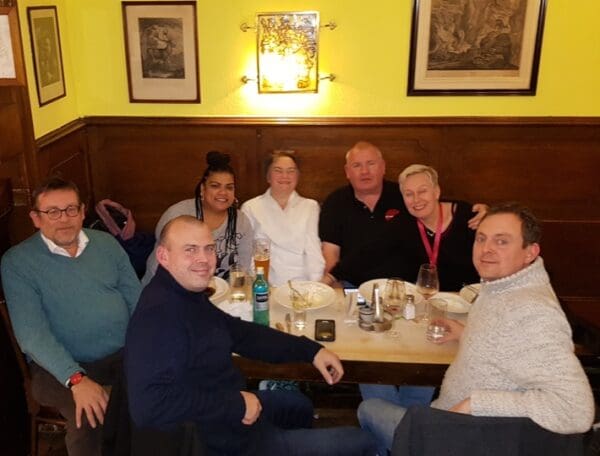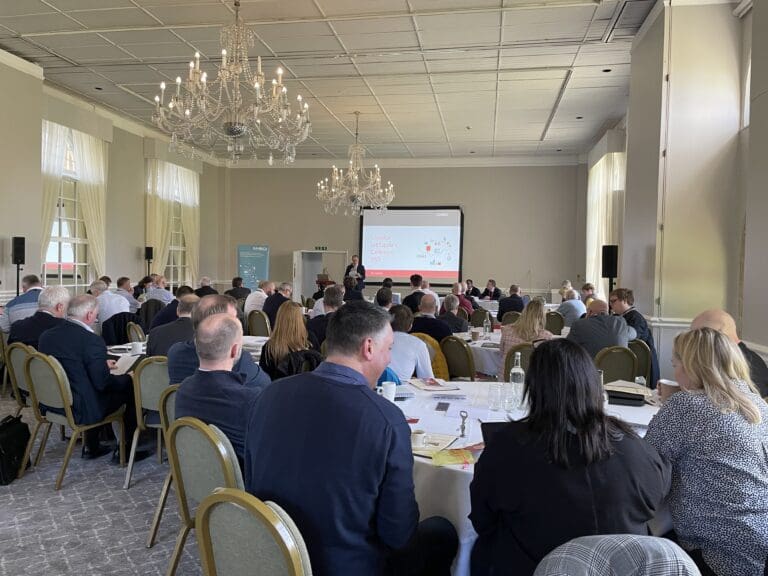Jacqueline Balian, Head of the Laboratory Technology Sector, GAMBICA
In this article, Jacqueline shares her experience before GAMBICA, and explains what her role is within GAMBICA. She also discusses recruitment and the shortage of field engineers both at entry level and at more experienced levels.
Jacqueline Balian is the Head of the Laboratory Technology Sector at GAMBICA.
GAMBICA (Group of Associations of Manufacturers of British Instrumentation, Control and Automation) is the Trade Association for Instrumentation, Control, Automation and Laboratory Technology in the UK.
The purpose of GAMBICA is to help their member companies to grow and develop. (There is more information about GAMBICA at the end of this article.)


Background
Jacqueline originally worked for the UK government as a press officer including Michael Howard when he was a minister.
After that she specialised in the health and safety brief, working closely with the HSE (Health and Safety Executive).
Ofgem
At Ofgem she ran the renewable heat incentive scheme, RHI, for Non-Domestic users, e.g., businesses, public sector, non-profits. The purpose of the scheme was to encourage businesses (and individuals) to switch from using heat generated by traditional (fossil fuels) methods:
Gas
Oil
To heat generated by renewable sources:
Biomass boilers
Heat pumps – ground source or air source
Solar thermal
This was a government incentive and used public money. So, a key part of the scheme was to ensure that payments were made for genuine usage change. Rather than an initial grant, the government gave the companies a sum of money over a period of years. This would be paid each quarter depending on how much renewable heat had been generated.
A major problem with these types of incentives was a shortage of skilled engineers able to install and maintain the equipment and meters being installed.
Also, although the equipment was cutting edge, it was being installed in buildings which were of different ages, designs, and quality. Renewable systems like heat pumps need to be adjusted more than once to make them work optimally so couldn’t just be installed, switched on and left with the customer. In previous incentive schemes, the people operating the building often couldn’t use the new equipment and so it was left doing nothing.
The type of engineer needed was someone with a lot of experience and practical knowledge of different systems; someone able to take old infrastructure and align with new systems and to get it all to work.
Current role
What is a key part of your role?
I spend most of my time arranging meetings for our members. This is because so much is remote now which reduces the opportunities for networking and learning useful things and meeting interesting people.
Effective networking is so useful and speeds things up. For managers of field engineers, we have an ‘After Sales’ group.


Recruitment of field service engineers and technicians
Has finding field service engineers and technicians remained an issue?
Yes, lot of our members have problems in having sufficient engineering technicians for their equipment.
What is happening as a result of this?
Companies improvise and so things start to happen like:
Clubbing together and sharing engineers between companies.
Outsourcing engineers from one company to another.
Sometimes it works but sometimes it is not very satisfactory.
Can you give an example?
For example, a major facilities management company has just lost the contract to run the facilities and service all the equipment of a major UK pharmaceutical company. So, the question now is: “who is going to pick up that work?”
Will it be all the individual companies who have their equipment in the laboratories, or will it be other cross-disciplinary generalised servicing companies?
Does general service work for high tech equipment?
If you’re right at the cutting edge, your equipment probably isn’t suitable for a generalist service company.
Apprenticeships
Are apprenticeships for field engineers a problem at present?
Yes, it is a problem.
The further education system in the UK is problematic. The link between colleges and employers is improving but not great. Colleges are underfunded and therefore under pressure and stress, and so don’t have time for a lot of things which would improve the number of apprenticeships.
For example, there is an apprenticeship for scientific equipment installation and maintenance. None of our members knew about it even though it could be very relevant to them.
To run a course, a college needs to have fifteen students. So GAMBICA can help companies get together to enable the members to reach the critical mass needed to run the course at a local college. After the course, the engineers and technicians coming out of the training can be employed by these companies who have a shortage of skilled engineers.
Recruitment
How are your members finding the recruitment of field engineers and technicians at present?
All of them tell me that they are having difficulties in recruitment.
To be honest, this is true of every membership body I’ve ever been part of – it is a perennial problem.
Can field engineers and technicians move from one industry to another?
Yes, they can but it needs someone to facilitate this. For example, there is an organisation called Talent Retention Solutions (TRS) which exists specifically to keep highly skilled people in highly skilled jobs. What happened at Rolls Royce triggered this. When they made redundancies, a lot of people who left went into unskilled jobs. TRS aims to help with this by linking skilled people with employers who need those or similar skills.
Similar organisations in other countries
What exists in other countries?
We have equivalent bodies in many other countries, and we have particularly strong links with Spectaris, the GAMBICA equivalent in Germany and ALDA in the USA. We have mutual interests, for example, Spectaris drew our attention to EU plans to ban PFAS. Known as ‘forever chemicals’ PFAS are present in non-stick coatings and many other applications and can have serious impacts on humans. But they are a huge range of different chemicals, some of which are essential to some laboratory equipment, so we are working with Spectaris to ensure just the right ones get restricted.


Example of a company who has recently joined GAMBICA
Who are they, why did they join, what sort of engineers do they need?
Our most recent joiners are a company called Sphere Fluidics. They make very high-tech systems for generating micro droplets of fluid which can be used like tiny test tubes to hold and analyse single molecules or cells. Most of their products go for export but they provide servicing and maintenance for the equipment sold in the UK, and increasingly for that sold overseas too. Lots of our members frequently send service engineers overseas.
GAMBICA
How do you think The Field Engineer community can support GAMBICA and other similar trade organisations?
We would love more Field Engineers to know about the interesting and well-paid jobs available in the lab sector and The Field Engineer community can definitely help with that! Our companies pay c£30,000 for an engineer straight out of university and the work is clean and well-clustered, usually around university hubs like Manchester or Birmingham, or in the London/Oxford/Cambridge life sciences triangle. Our Board is now aware of The Field Engineer community so I hope they are already starting to post jobs your community members might be interested in, so please check them out!
Further information about GAMBICA


A significant number of activities and issues affect all GAMBICA member industries and are termed ‘Cross Sector Activities.’
GAMBICA is then generally separated into the following four main sectors, each with a Sector Head to manage the activities for their sector. There is also a university engagement sector.
Industrial Automation
Major product focuses within this sector are drives and controls, control gear, and automation products. Members within this sector are often (though not exclusively) suppliers of discrete manufacturing industries e.g. Automotive, Aerospace, Energy Distribution, Food & Beverage and Pharmaceutical.
Process Instrumentation & Control
Major product focuses within this sector are distributed control systems and measurement instruments with a specific focused on suppliers to the process manufacturing industries. e.g. Oil & Gas, Chemical, Petrochemical, Food & Beverage and Pharmaceutical.
Test & Measurement
Major product focuses within this sector are portable hand-held electrical testing equipment, high voltage detectors, radio and communications testing, and various other specialist testing equipment.
Laboratory Technology
Major focuses in this sector are laboratory instrumentation, equipment, consumables, chemicals and services, this sector includes suppliers of laboratories of all types, from industrial labs to academic and public health sector labs.
University Engagement
GAMBICA’s University Engagement Sector is home to any UK University or Further Education establishment whose education or research activities are relevant to GAMBICA’s industry and associate members.


Joining GAMBICA
Who can join you and how do they do it?
Any UK based company working in the relevant fields can join GAMBICA, just get in touch: jacqueline.balian@gambica.org.uk


Responses